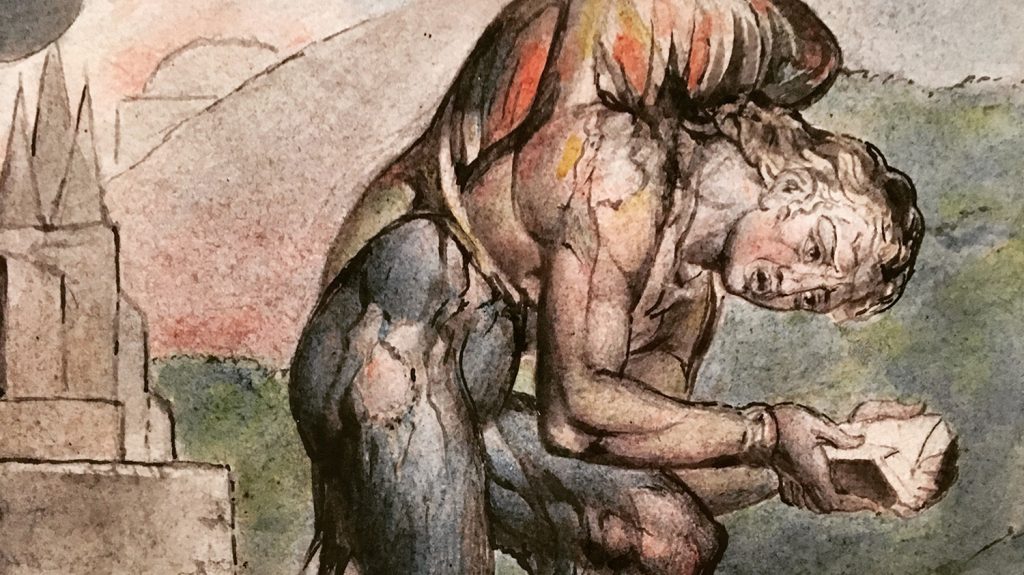Today is the birthday of John Bunyan, the early English Baptist preacher who is best known as the author of The Pilgrim’s Progress (as pictured above by William Blake). Bunyan was born in 1628 in Harrowden, Bedfordshire, as the son of a tinker and grandson of a chap-book salesman, which were lowly trades. Bunyan later said, ‘I was taken out of the dunghill.’ He only started to find religion after he married into a God-fearing family, and after several years of soul-searching in which his progress to faith was painful, contradictory and slow, giving him the lived material he needed to write his great book.
‘Now was my heart filled full of comfort and hope, and now I could believe that my sins should be forgiven me; yea, I was now so taken with the love and mercy of God, that, I remember, I could not tell how to contain till I got home: I thought I could have spoken of his Love, and have told of his mercy to me, even to the very Crows that sate upon the plowed lands before me, had they been capable to have understood me.’ John Bunyan, Grace Abounding to the Chief of Sinners
The poet, artist and printmaker William Blake was born today in 1757, in Soho, London. His life as a mystic was first noticed when he was a child. At the age of eight, he told his mother that he saw a tree on Peckham Rye ‘filled with angels, bright angelic wings bespangling every bough like stars’. The visions continued throughout his life.
He who binds to himself a joy
Does the winged life destroy
But he who kisses the joy as it flies
Lives in eternity’s sunrise.
William Blake
The Italian spiritual writer Lorenzo Scupoli died today in 1610. He is the author of The Spiritual Combat, a manual of holy living which is highly practical, giving advice about how to engage in ‘constant and sharp warfare’ against the ego, and embrace a life of virtue and trust in God. Scupoli’s book was translated into many languages, and was admired and adapted by leading monastic figures in Greek and Russian Orthodoxy, making it a rare bestseller on both sides of the East-West Church divide.
‘If you aspire to such a pitch of perfection, you must daily do violence to yourself, by courageously attacking and destroying all your evil desires and affections. In great matters as well as in small, it is necessary, then, that you prepare youself and hold yourself in readiness for this conflict, for he only will be crowned who was brave in the battle.’ Lorenzo Scupoli, The Spiritual Combat
Agnes Beaumont, a young woman who was maliciously accused of being John Bunyan’s lover (he once let her ride pillion on his horse), died today in 1720. She was a deeply committed member of Bunyan’s congregation, which brought her into conflict with her father, who tried to force her not to go to Bunyan’s meetings. When her father died unexpectedly, she was then accused of murdering him, but was able to clear her name. She wrote a dramatic and heartfelt account of her trials and eventual triumph, The Narrative of the Persecution of Agnes Beaumont.
‘So I came home ploshing through the dirt, over shoes having no pattings on. I made what haste I could, hoping I should be at home before my father was abed; but when I came near the house, I saw no light in it. So I went to the door, and found it locked, with the key in it. Then my heart began to ache with fear… but however, I went to his chamber window, and called to him. He asked who was there. It is I, father, said I, pray will you let me in; I am come home wet and dirty. Said he, where you have been all day, go at night; and many such like things, for he was very angry with me, for riding behind Mr Bunyan, and said I should never come within his doors again.’ Agnes Beaumont, The Narrative of the Persecution of Agnes Beaumont
John Atherton, the Bishop of Waterford in Ireland, was found guilty today in 1640 of lying with mankind as he lieth with a woman, to quote the King James Bible. He was hanged, after being reduced from haughty derision to abject penitence by a week in a dark cell with no company but a Puritan chaplain and his coffin. In his scaffold speech, he denied the crime, but admitted many others which he said were too shameful for him to mention. One contemporary pamphlet used its imagination and reported that he had confessed to lying with a cow as he lieth with a woman.
Image: Simon Jenkins
